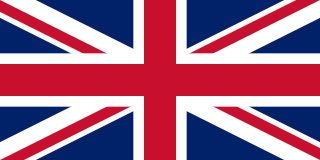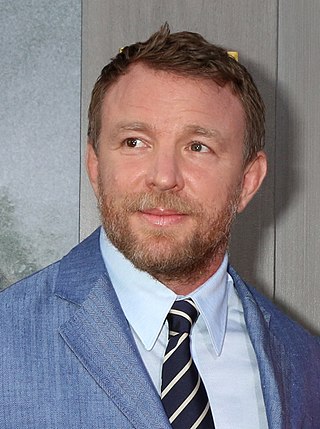
Bermuda is a British Overseas Territory in the North Atlantic Ocean. The closest land outside the territory is in the American state of North Carolina, about 1,035 km (643 mi) to the west-northwest.

England is a country that is part of the United Kingdom. It is located on the island of Great Britain, of which it covers approximately 62%, and over 100 smaller adjacent islands. It has land borders with Scotland to the north and Wales to the west, and is otherwise surrounded by the North Sea to the east, the English Channel to the south, the Celtic Sea to the south-west, and the Irish Sea to the west. Continental Europe lies to the south-east, and Ireland to the west. At the 2021 census, the population was 56,490,048. London is both the largest city and the capital.

The oldest known surviving film was shot in the United Kingdom as well as early colour films. While film production reached an all-time high in 1936, the "golden age" of British cinema is usually thought to have occurred in the 1940s, during which the directors David Lean, Michael Powell, and Carol Reed produced their most critically acclaimed works. Many British actors have accrued critical success and worldwide recognition, such as Audrey Hepburn, Olivia de Havilland, Vivien Leigh, Glynis Johns, Maggie Smith, Laurence Olivier, Michael Caine, Sean Connery, Ian Mckellen, Joan Collins, Judi Dench, Julie Andrews, Daniel Day-Lewis, Gary Oldman, Emma Thompson, Anthony Hopkins and Kate Winslet. Some of the films with the largest ever box office returns have been made in the United Kingdom, including the fourth and fifth highest-grossing film franchises.

The United Kingdom of Great Britain and Northern Ireland, commonly known as the United Kingdom (UK) or Britain, is a country in Northwestern Europe, off the coast of the continental mainland. It comprises England, Scotland, Wales, and Northern Ireland. The UK includes the island of Great Britain, the north-eastern part of the island of Ireland, and most of the smaller islands within the British Isles. Northern Ireland shares a land border with the Republic of Ireland; otherwise, the United Kingdom is surrounded by the Atlantic Ocean, the North Sea, the English Channel, the Celtic Sea, and the Irish Sea. The total area of the United Kingdom is 94,354 square miles (244,376 km2), with an estimated population of nearly 67.6 million people in 2022.

Guy Stuart Ritchie is an English film director, producer and screenwriter. His work includes British gangster films and the Sherlock Holmes films starring Robert Downey Jr.

Romeo and Juliet is a 1968 period romantic tragedy film, based on the play of the same name by William Shakespeare. Directed and co-written by Franco Zeffirelli, the film stars Leonard Whiting as Romeo and Olivia Hussey as Juliet. Laurence Olivier spoke the film's prologue and epilogue and dubs the voice of Antonio Pierfederici, who played Lord Montague but was not credited on-screen. The cast also features Milo O'Shea, Michael York, John McEnery, Bruce Robinson, and Robert Stephens.
The British Academy Film Awards, more commonly known as the BAFTA Awards, is an annual award show hosted by the British Academy of Film and Television Arts (BAFTA) to honour the best British and international contributions to film. The ceremonies were initially held at the flagship Odeon Cinema in Leicester Square in London, before being held at the Royal Opera House from 2007 to 2016. From 2017 to 2022, the ceremony was held at the Royal Albert Hall in London before moving to the Royal Festival Hall for the 2023 ceremony. The statue awarded to recipients depicts a theatrical mask.

The British Overseas Territories (BOTs) are the 14 territories with a constitutional and historical link with the United Kingdom that, while not forming part of the United Kingdom itself, are part of its sovereign territory. The permanently inhabited territories are delegated varying degrees of internal self-governance, with the United Kingdom retaining responsibility for defence, foreign relations and internal security, and ultimate responsibility for good governance. Three of the territories are chiefly or only inhabited by military or scientific personnel, the rest hosting significant civilian populations. All fourteen have the British monarch as head of state. These UK government responsibilities are assigned to various departments of the Foreign, Commonwealth and Development Office and are subject to change.

Jennifer Ann Agutter is an English actress. She began her career as a child actress in 1964, appearing in East of Sudan, Star!, and two adaptations of The Railway Children; the BBC's 1968 television serial and the 1970 film version. In 1971 she also starred in the critically acclaimed film Walkabout and the TV film The Snow Goose, for which she won an Emmy Award for Outstanding Supporting Actress in a Drama.

The British Film Institute (BFI) is a film and television charitable organisation which promotes and preserves film-making and television in the United Kingdom. The BFI uses funds provided by the National Lottery to encourage film production, distribution, and education. It is sponsored by the Department for Culture, Media and Sport, and partially funded under the British Film Institute Act 1949.

Sir Stephen Arthur Frears is a British director and producer of film and television, often depicting real life stories as well as projects that explore social class through sharply-drawn characters. He has received numerous accolades including three BAFTA Awards, and a Primetime Emmy Award as well as nominations for two Academy Awards. In 2008, The Daily Telegraph named Frears among the 100 most influential people in British culture. In 2009, he received the Commandeur de l'Ordre des Arts et des Lettres. He received a knighthood in 2023 for his contributions to the film and television industries.
Structural film was an avant-garde experimental film movement prominent in the United States in the 1960s. A related movement developed in the United Kingdom in the 1970s.
Events from the year 1968 in the United Kingdom.
This is a chronological list of films produced in the United Kingdom split by decade. There may be an overlap, particularly between British and American films which are sometimes co-produced; the list should attempt to document films which are either British produced or strongly associated with British culture. Please see the detailed A-Z of films currently covered on Wikipedia at Category:British films.

The Ford Cougar is a D-segment coupé that was produced and sold in the European market between 1998 and 2002, and sold in Canada and the United States from 1999 until 2002 as the Mercury Cougar.

The 61st Annual Cannes Film Festival was held from 14 to 25 May 2008. The President of the Official Jury was American actor and director Sean Penn. Twenty two films from fourteen countries were selected to compete for the Palme d'Or. The awards were announced on 24 May, French film The Class, directed by Laurent Cantet, was awarded the Palme.
Paul Willemen was a Belgian-born British professor, author and essayist. According to the British Film Institute, he was regarded as "a pioneering figure in the revolution in thinking about the cinema that began in the 1970s". His essays and books have dealt with cinema.












